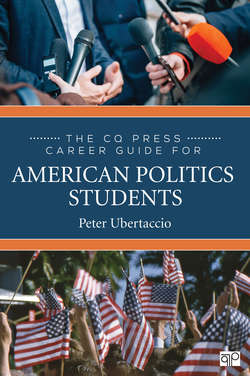Читать книгу The CQ Press Career Guide for American Politics Students - Peter Ubertaccio - Страница 18
На сайте Литреса книга снята с продажи.
ОглавлениеChapter 2 Coursework and Internships
This chapter focuses on helping students align their interests in American politics with the appropriate coursework and internship or work opportunities. It presents professional development during your college years.
Here you will consider how to link your coursework to your professional aspirations in ways you might not have yet imagined. The chapter discusses the importance of internships and offers tips on how to manage multiple internships, navigating unpaid and paid internship opportunities, and building a network from your experiential opportunities.
Chapter Objectives
To introduce you to the primary curriculum for students of American politics and link that curriculum to career objectives
To encourage you to consider the goals of a double major and/or minor course of studies
To develop a list of curricular and co-curricular opportunities for students in American politics
To link curricular and co-curricular choices and those choices to skill sets valued in the marketplace
To discover the importance of internships and other experiential opportunities
To develop a professional resume reflecting your major, minor, and co-curricular accomplishments
Your coursework and curricular decisions start to tell the story of who you are and where your interests lie. This developing story will help you navigate life when you’re done with college.
This chapter also discusses how to translate the skills you’re acquiring in your courses, your co-curricular choices, and your experiential learning opportunities such as internships in a way that employers, professional and graduate schools, and postgraduate service providers will understand. You’re developing three types of skills:
1 Knowledge of substantive content. Your courses are expanding your knowledge base of the critical theories, facts, and analyses of the contours of American politics.
2 Soft skills. The National Association of Colleges and Employers (NACE) calls these transferable, meaning they transfer nicely into any workplace. They’re “people skills,” and NACE offers a useful guidepost: Transferrable or soft skills are the skills necessary regardless of the field or sector of the workforce.
3 Technical or hard skills. These types of skills are far more job specific, but you are likely encountering them in your curriculum: for example, formatting an Excel spreadsheet to lay out data in a visual presentation, designing a website, writing a policy memo, navigating research databases, and working with datasets.
You may not realize it at first, but you are developing all three of these types of skills as soon as you enter college. We’ll refer back to these throughout this guide.
What is your curriculum?
Your curriculum is a combination of required courses for your major, any courses needed for your college’s general education or core program, and elective choices that you make over your 4 years in college. Ideally, you craft your curriculum to your interests. If you’ve decided to major in political science, you’ve primarily chosen a curriculum that fits your goals and aspirations. Your college or university and your specific academic department probably has its own mission and learning objectives. These are useful to understand as you prepare for curricular choices each year. These objectives help us all stay on track toward the larger goal of understanding what it is we should know as students of American politics. They also provide us with guideposts for your future.
Defined broadly, a focus on American politics as part of a political science major should have the following learning outcomes:
Introductory knowledge of the main theories and perspectives of American politics
Substantive understanding of this subfield through required upper-level courses in fields
Knowledge of the other subfields of the discipline (international relations, comparative politics, political theory)
The ability to formulate a research design and utilize the appropriate methodology to write a research paper in American politics
Critical thinking and analytical skills
These goals are broad but help to clarify the types of courses you should seek as you navigate through your curriculum.
Every institution has its own set of requirements, but there are many courses in common beyond your introductory or prerequisite courses. As a student in American politics, you should find your way to some of the basic courses in the field:
Congress and the Presidency (this class might be the equivalent of two separate courses at your institution)
Political Parties, Interest Groups, Elections and Voting Behavior
Constitutional Law and Civil Rights and Civil Liberties
Public Policy Analysis and specific policy courses
Your school might also offer upper-level courses in the following:
Race and American politics
Women in politics
Public administration or courses on bureaucracy
Research methods in political science
Media and politics
Judicial politics
Federalism
American political history
The range of elective choices that you take within your major can be a mix of your professional interests (a future town administrator should understand bureaucracy and budgetary politics), as well as broadly defined passion areas. Students in American politics should understand some of the widely established issues that punctuate our politics, so you will want to check out courses on environmental politics, the politics of race, inequality, business organizations, and women in power.
Telling Your Story
Here are curricular choices that will help you answer the question, “What problem do I want to solve?”
